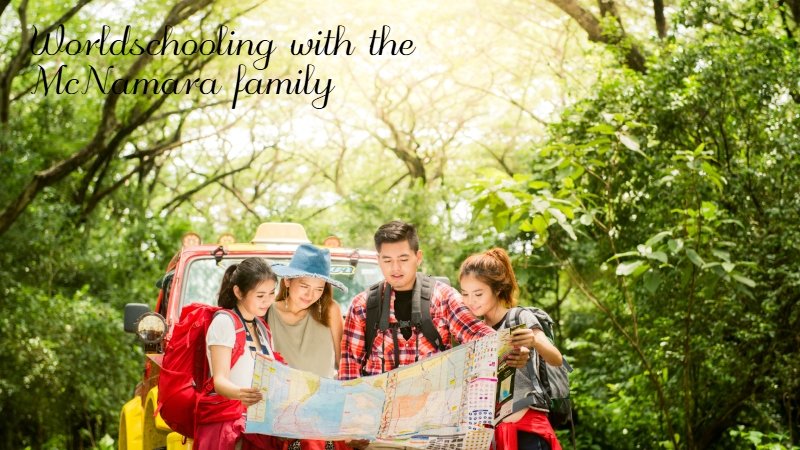In an age when traditional schooling tends to limit experiential learning, the McNamara family has normalized what it’s like to learn kids. The globe-trotting mom, Rachel, and dad, Chris, who write the blog The HomeTrotters, have opted for worldschooling, an experience that interweaves travel, culture, and individualized learning for their kids. This article delves into the mechanics of worldschooling, how the McNamaras make it work, and advice for families inspired to follow in their footsteps.
Who are the McNamaras?
Chris and Rachel McNamara are traveling, full-time digital entrepreneurs and mothers to three small children. They started off by challenging the strictness of conventional schooling and providing their children with a global classroom instead. On their blog and social media platforms, they share their travels, milestones in learning, and everyday hurdles of worldschooling on the move.
What is Worldschooling?
Worldschooling is a different kind of educational system where travel is part of a child’s learning process. Instead of regular school, children learn from local cultures, hands-on, nature, museums, and online tools. It fosters independence, global consciousness, and responsive learning.
For the McNamaras, worldschooling is not merely about geography lessons in foreign lands; it’s about doing right by kids and developing curious, empathetic, and globally aware children.
Core Logistics: How the McNamaras Make It Work
1. Legal and Educational Framework
The McNamara family complies with homeschooling laws of their home nation during travel. They have appropriate documentation, prepare yearly portfolios of work accomplished by their children, and avail themselves of umbrella schools or legal homeschool charters as needed.
Pro Tip: Families need to discover home education legislation in the home country prior to embarking on worldschooling.
2. Digital Learning Tools and Curriculum
Though the McNamaras are firm on experiential learning, they make use of systematic tools such as:
- Khan Academy for Math and Science
- Duolingo for learning local languages
- Outschool for virtual group classes
- Epic! for digital reading libraries
- Google Classroom to keep assignments organized and monitor progressThey work on a flexible curriculum, mixing online courses with museum visits, history tours, and cultural workshops in every country they go to.
3. Travel Scheduling and Planning
Worldschooling is enjoyable but requires good planning. The McNamaras plan their travels according to:
- Visa policies (90-day stays, digital nomad visas, etc.)
- Weather and climate
- Festivals and educational celebrations
- Local security and healthcare resources
They rent Airbnb or co-living apartments for extended periods to create a home environment with designated learning zones.
4. Finances and Source of Income
The family finances their lifestyle with remote freelance writing, blogging, and sponsored posts. Their blog generates income from:
- Affiliate marketing (travel gear, online education software)
- Sponsored travel opportunities
- Digital products like eBooks and worldschooling guides
They maintain a monthly budget and track spending with apps like Trail Wallet and Mint.
5. Health and Safety
Traveling with children requires extra caution for health. The McNamaras:
- Have international health insurance
- Have emergency kits ready
- Use local clinics and telemedicine
- Receive necessary vaccinations based on the regionThey also take care of mental well-being by maintaining routine, downtime, and honest communication.
Socialization: How Their Kids Make Friends
A popular myth is that worldschoolers have no social interaction. But the McNamara kids have regular contact with:
- Local children at parks or community gatherings
- Other families who worldschool through Facebook groups or meetups
- Online clubs and forums
- Education co-ops in popular expat destinations such as Bali, Portugal, and Mexico
Challenges the McNamaras Have
Worldschooling isn’t all sunshine and flights. The family has experienced:
- Burnout from continual traveling
- Time zone difficulties with online classes
- Having reliable Wi-Fi for work and education
- Loneliness or culture shock at new destinations, they manage to overcome those obstacles by their resilience, collaboration, and flexibility.
Key Lessons of the McNamara Worldschooling Experience
- Flexibility is the key — travel plans to learning styles.
- Structure does not disappear, particularly with young children.
- Community works — online and in-person networks are invaluable.
- Each place is a lesson — geography, history, culture, and life skills.
- Parent learning is included in the deal, from patience to problem-solving.
Tips for Families Who Want to Begin Worldschooling
- Begin with short-term journeys before becoming a full nomad.
- Subscribe to Facebook groups such as “Worldschoolers” and “Global Homeschoolers”.
- Create a portable income stream (freelancing, remote work, blogging).
- Pack smart: bring learning tools, not merely travel equipment.
- Keep family routines for stability and peace.
Conclusion
The McNamara family journey is a testament to how worldschooling can turn the world into a classroom. It is not always easy, but with good logistics, planning, and attitude, it is a richly rewarding lifestyle. Their experience inspires hundreds of families to reimagine what education can be, beyond four walls.
Whether imagining days of prolonged travel or just curious about non-traditional education, the McNamaras prove that with passion and planning, the world truly is your school.
